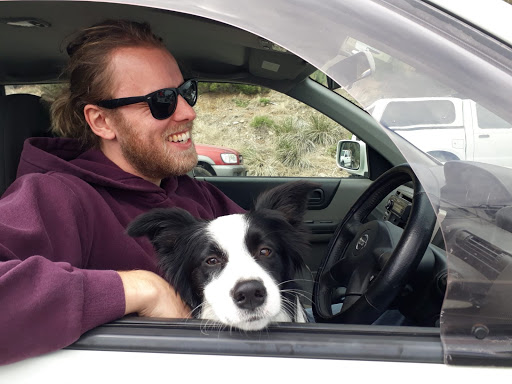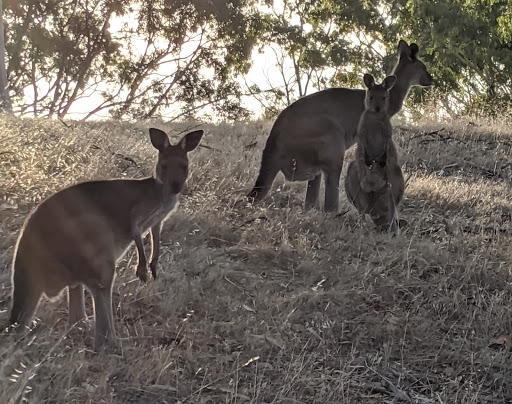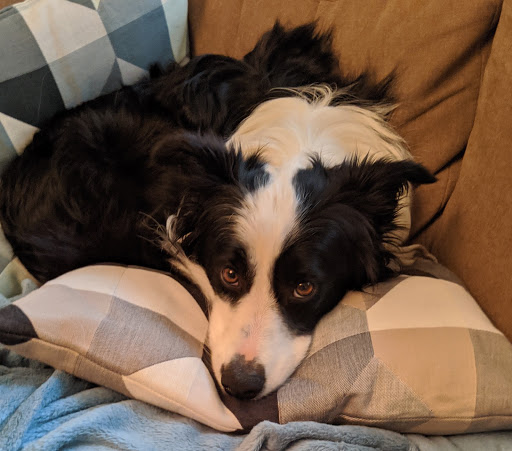1. Hey, can you please introduce yourself?
Hi! My name is Florian and I’m originally from an area in Germany called the Ruhr Valley. Formerly known for lots of mining, it has transformed into a large population hub with lots of universities around. This is where I studied IT Security (I guess you call it Cybersecurity these days) at Ruhr University Bochum.
After finishing my Master’s degree there, I got the opportunity to move to Sydney, Australia to work for a software company called Atlassian, initially as part of their detection & incident response team which tries to detect bad guys hacking into the company. I later transitioned to the preventive side trying to stop the bad guys from getting in in the first place.
While still in Sydney, I transitioned into a remote role and subsequently relocated to Adelaide in January 2020 which is where I am now.
2. What motivated you to choose remote working?
My dog 😅 No seriously, I didn’t expect to become a remote worker. But when I got my dog (a gorgeous Border Collie called Loki), I started out working from home while he was a puppy with the aim to transition back to 4 days in office and one day working from home. However, when I tried to go from 2 days a week in the office to 3 days, I realised how much of my energy is drained by the daily commute and the busy life of the city centre.

So I asked my manager if we could stick to a 2:3 split, where I come into the office on Tuesdays and Thursdays and work from home on the other days. It worked so well, I did this for over a year and it slowly emerged that I would like to become a full-time remote employee. Sydney just wasn’t the place for me, but I wanted to stay with Atlassian and so I worked with my manager on the transition.
3. What were your initial months like? Did it live up to your expectations?
Because the transition was over such a long time, I was well prepared for remote life. In fact, we even did a 6-week trial period where I was already working like a remote employee without moving away. This gave my manager and myself the confidence that this was the right step.
I then pulled the trigger and moved to Adelaide and so far it has been an entirely positive experience. In all fairness though, shortly after my move, Australia went into lockdown and now that everyone is remote, those of us who have prepared are actually at a slight advantage (we had an office set up and a life organised around remote work). Long-term the jury is still out on whether this is going to work out, but I’d say the odds are in my favour.
4. How did you find remote working roles?
Like I said above, I didn’t really set out to become remote, it was a sort of natural evolution. However, it definitely helped that I was not the first person on my team to make this transition as well as having an employer who is generally open to the idea for teams that think they can make it work.
5. What have been the best, good and worst aspects of remote working for you?
My favourite part of working remotely has to be the flexibility that comes with it. It’s what everyone says because it’s true. This is augmented by having no commute (although I miss having that dedicated time to listen to my podcasts and audiobooks) and the fact that my dog is around me all the time. Due to the fact that my day is often a lot of meetings, I don’t find that I feel socially isolated. On the contrary, I have many days where I feel exhausted at the end of the day and I’m glad to have some quiet time. In my free time, I go out with friends and I used to have house mates while I was living in Sydney.
Being remote allowed me to live where I want and now I get to live outside of a busy city centre and have nature right around the corner.

The worst part is working with teams that aren’t quite as remote-friendly as my own and my role is quite cross-functional. While these teams try to be accommodating, the fact that they are not used to it means they regularly huddle in meeting rooms and I am “big head on screen”. If they don’t make an effort to include me, then I have a hard time chiming in, especially if the discussion is more passionate, for example on a controversial topic.
6. What tools do you swear by while working remotely?
Unsurprisingly, Slack and Zoom are at the top of the list. Without those, I couldn’t do my job. Naturally, as we are the company that makes Jira, that’s where we track our work. We have the team-internal mantra of “no ticket, no work” meaning that if there was no ticket that you can’t expect anyone to know you were working on it. This is something we’ve had independently of remote work, since we are also a globally distributed team, but it has certainly helped me.
Beyond that, I would say “the usual”: Calendar & Mail plus maybe some note taking software. But this is regardless of remote. In general, I didn’t have to change my tools too much when I went remote. More Slack and more Zoom are really the dominant technologies for me. When Slack went down the other day, I realised how much I relied on it.
7. Your most exciting/ hilarious experience since you started working remotely.
That would probably be the team presentation on empathy and collaboration I gave. By its very nature it is a risky subject and I wanted to highlight to the team how misunderstandings can be resolved and conflicts avoided or managed if you apply the principle of “assume good intent”. Couple that with a 50+ audience with some senior managers and you have quite a serious setting (by our standards, at least). All of this is obviously happening on Zoom.
Now imagine Loki, my hyperactive Border Collie, in the background chasing his tail and crying for attention and you have the perfect chaos. Not only was I having a hard time trying to focus (thank you noise-cancelling headphones!), my audience was also struggling to pay attention to this serious topic with all the shenanigans going on in the background…

In the end I managed to finish the presentation and everyone had a good laugh, but it was certainly one of the more taxing presentations I have given.
8. What is your golden advice to a new remote worker?
First, set up deliberate social meetings. These are agendaless meetings where you can talk about anything from your current projects to company gossip and personal life. Set these up as group calls or 1-on-1s with people you work with but also those you would normally only talk to over lunch or in the hallway (“water cooler chats”). It’s incredibly important that you have this time both to remain connected but also because these social events build a personal relationship that is an important foundation for collaboration, especially when conflict arises.
Second, over-communicate. I might be biased due to the nature of also being on a distributed team with multiple time zones, but make sure you try to always send all the necessary context, especially on Slack. Text-based communication is incredibly hard and misunderstandings as well as follow-up questions are inevitable. Adding plenty of detail ensures the recipient(s) have all the necessary information to proceed when you might not be available.
9. How do you see your career shaping up and your goals?
This is not something I have given much thought in the past, but recently I started to take a more active approach in shaping my career. To be honest, most of what I do when thinking about career development is not remote-specific. As I mentioned, I work in a cross-functional role which means I often work with different people and have little to no authority over the projects other teams decide to run. Instead, I rely on collaboration and shared goals. To be successful in this area, I recently finished reading the excellent “Getting to yes” by Fisher, Ury & Patton. I see my career taking a trajectory where more and more, it is all about working effectively as a team and to accomplish that, paying attention to the human on the other side is not only necessary, it’s also the right thing to do.
As for being remote, I am not committed to this lifestyle forever. Should circumstances change, I’d explore being in the office more again. For now it works well for me and I enjoy it a lot.
10. How do you expect remote working to evolve in the future?
I think it’s pretty obvious that we are going to see a massive surge in remote work given the current situation. We’re also seeing some negative connotations of remote work being cleared up as people realise that working from home doesn’t mean you just watch Netflix all day.
Some employers are going to realise that their employees demand it and that they’ll struggle to keep people around that would happily look for remote opportunities elsewhere. In addition, benefits like less sick leave taken (I can work a few hours if I’m not feeling up to a full day in the office) and less infections (stay home if you have the sniffles, don’t “soldier on”) will make this choice more appealing for many employers.
On the other hand, both employers and employees may find out who is suited for remote work and who is not. It’s not for everyone, so some might say they can’t imagine this lifestyle for themselves. They might appreciate some extra flexibility that comes with the odd WFH day, though.
Remote work is here to stay and employers should take a careful look at their teams and whether there are potential ways to enable it. It unlocks hiring potential and is great for employee retention.
11. Where can we follow you on?
I’m not really active on social media but you can find me on LinkedIn.
Are you a remote worker too?
Would you like to share you story?
Just reach us at hrishikesh@remote.tools!